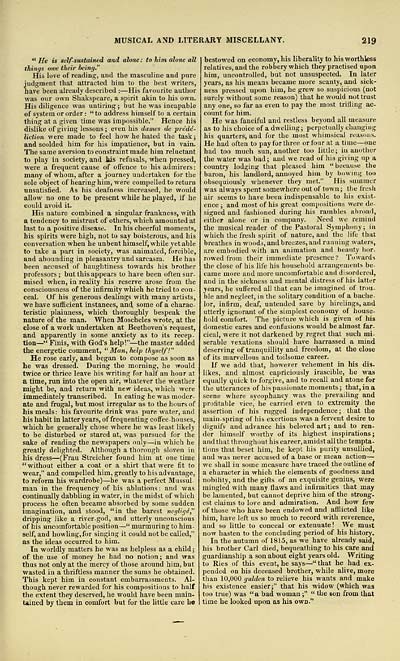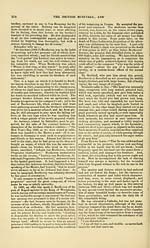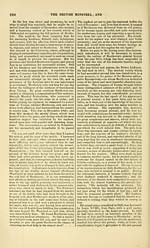Glen Collection of printed music > Printed music > British minstrel, and musical and literary miscellany
(227) Page 219
Download files
Complete book:
Individual page:
Thumbnail gallery: Grid view | List view

MUSICAL AND LITERARY MISCELLANY.
ai9
" He is self-sustained and alone : to him alone all
things oive their being."
His love of reading, and the masculine and pure
judgment that attracted him to the best writers,
have been already described : — His favourite author
was our own Shakspeare, a spirit akin to his own.
His diligence was untiring ; but he was incapable
of system or order : " to address himself to a certain
thing at a given time was impossible." Hence his
dislike of giving lessons ; even his dames de prede-
liction were made to feel how he hated the task;
and scolded him for his impatience, but in vain.
TJie same aversion to constraint made him reluctant
to play in society, and tis refusals, when pressed,
were a frequent cause of offence to his admirers :
many of whom, after a journey undertaken for the
sole object of hearing him, were compelled to return
unsatisfied. As his deafness increased, he would
allow no one to be present while he played, if he
could avoid it.
His nature combined a singular frankness, with
a tendency to mistrust of others, which amounted at
last to a positive disease. In his cheerful moments,
his spirits were high, not to say boisterous, and his
conversation when he unbent himself, while yet able
to take a part in society, was animated, forcible,
and abounding in pleasantry and sarcasm. He has
been accused of haughtiness towards his brother
professors; but this appears to have been often sur-
mised when, in reality his reserve arose from the
consciousness of the infirmity which he tried to con-
ceal. Of his generous dealings with many artists,
we have sufficient instances, and some of a charac-
teristic plainness, which thoroughly bespeak the
nature of the man. When Moscheles wrote, at the
close of a work undertaken at Beethoven's request,
and apparently in some anxiety as to its recep-
tion — " Finis, with God's help !" — the master added
the energetic comment, "Man, help thyself!"
He rose early, and began to compose as soon as
he was dressed. During the morning, he would
twice or thrice leave his writing for half an hour at
a time, run into the open air, whatever the weather
might be, and return with new ideas, which were
immediately transcribed. In eating he was moder-
ate and frugal, but most irregular as to the hours of
his meals : his favourite drink was pure water, and
his habit in latter years, of frequenting coffee. houses,
which he generally chose where he was least likely
to be disturbed or stared at, was pursued for the
sake of reading the newspapers only — in which he
greatly delighted. Although a thorough sloven in
his dress — (Frau Streicher found him at one time
"without either a coat or a shirt that were fit to
wear," and compelled him, greatly to his advantage,
to reform his wardrobe) — he was a perfect Mussul-
man in the frequency of his ablutions : and was
continually dabbling in water, in the midst of which
process he often became absorbed by some sudden
imagination, and stood, "in the barest negligd"
dripping like a river-god, and utterly unconscious
of his uncomfortable position — " murmuring to him-
self, and howling, for singing it could not be called,"
as the ideas occurred to him.
In worldly matters he was as helpless as a child;
of the use of money he had no notion; and was
thus not only at the mercy of those around him, but
wasted in a thriftless manner the sums he obtained.
This kept him In constant embarrassments. Al-
though never rewarded for his compositions to half
the extent they deserved, he would have been main,
tained by them in comfort but for the little care ho
bestowed on economy, his liberality to his worthless
relatives, and the robbery which they practised upon
him, uncontrolled, but not unsuspected. In later
years, as his means became more scanty, and sick-
ness pressed upon him, he grew so suspicious (not
surely without some reason) that he would not trust
any one, so far as even to pay the most trilling ac-
count for him.
He was fanciful and restless beyond all measure
as to his choice of a dwelling; perpetually changing
his quarters, and for the most whimsical reasons.
He had often to pay for three or four at a time — one
had too much sun, another too little; in another
the water was bad; and we read of his giving up a
country lodging that pleased him " because the
baron, his landlord, annoyed him l)y bowing too
obsequiously whenever they met." His summer
was always spent somewhere out of town ; the Iresh
air seems to have been indispensable to his exist-
ence ; and most of his great compositions were do-
signed and fashioned during his rambles abroad,
either alone or in company. Need we remind
the musical reader of the Pastoral Symphony; in
which the fresh spirit of nature, and the life that
breathes in woods, and breezes, and running waters,
are embodied with an animation and beauty lior-
rowed from their immediate presence? Towards
the close of his life his household arrangements be-
came more and more uncomfortable and disordered,
and in the sickness and mental distress of his latter
years, he suffered all that can be imagined of trou-
ble and neglect, in the solitary condition of a bache-
lor, infirm, deaf, untended save by hirelings, and
utterly ignorant of the simplest economy of house-
hold comfort. The picture which is given of his
domestic cares and confusions would be almost far-
cical, were it not darkened by regret that such mi-
serable vexations should have harrassed a mind
deserving of tranquillity and freedom, at the close
of its marvellous and toilsome career.
If we add that, however vehement in his dis-
likes, and almost capriciously irascible, he was
equally quick to forgive, and to recall and atone for
the utterances of his passionate moments ; that, in a
scene where sycophancy was the prevailing and
profitable vice," he carried even to extremity the
assertion of his rugged independence; that the
main-spring of his exertions was a fervent desire to
dignify and advance his beloved art ; and to ren-
der himself worthy of its highest inspirations;
and that throughout his career, amidst all the tempta-
tions that beset him, he kept his purity unsullied,
and was never accused of a base or mean action —
we shall in some measure have traced the outline of
a character in which the elements of goodness and
nobility, and the gifts of an exquisite genius, were
mingled with many flaws and infirmities that may
be lamented, but cannot deprive him of the strong-
est claims to love and admiration. And how few
of those who have been endowed and afflicted like
him, have left us so much to record with reverence,
and so little to conceal or extenuate! We must
now hasten to the concluding period of his history.
In the autumn of 1815, as we have already said,
his brother Carl died, bequeathing to his care and
guardianship a son about eight years old. Writing
to Ries of this event, he says — " that he had ex-
pended on his deceased brother, while alive, more
than 10,000 gulden to relieve his wants and make
his existence easier;" that his widow (which was
too true) was " a bad woman ;" " the eon from that
time he looked upon as his own."
ai9
" He is self-sustained and alone : to him alone all
things oive their being."
His love of reading, and the masculine and pure
judgment that attracted him to the best writers,
have been already described : — His favourite author
was our own Shakspeare, a spirit akin to his own.
His diligence was untiring ; but he was incapable
of system or order : " to address himself to a certain
thing at a given time was impossible." Hence his
dislike of giving lessons ; even his dames de prede-
liction were made to feel how he hated the task;
and scolded him for his impatience, but in vain.
TJie same aversion to constraint made him reluctant
to play in society, and tis refusals, when pressed,
were a frequent cause of offence to his admirers :
many of whom, after a journey undertaken for the
sole object of hearing him, were compelled to return
unsatisfied. As his deafness increased, he would
allow no one to be present while he played, if he
could avoid it.
His nature combined a singular frankness, with
a tendency to mistrust of others, which amounted at
last to a positive disease. In his cheerful moments,
his spirits were high, not to say boisterous, and his
conversation when he unbent himself, while yet able
to take a part in society, was animated, forcible,
and abounding in pleasantry and sarcasm. He has
been accused of haughtiness towards his brother
professors; but this appears to have been often sur-
mised when, in reality his reserve arose from the
consciousness of the infirmity which he tried to con-
ceal. Of his generous dealings with many artists,
we have sufficient instances, and some of a charac-
teristic plainness, which thoroughly bespeak the
nature of the man. When Moscheles wrote, at the
close of a work undertaken at Beethoven's request,
and apparently in some anxiety as to its recep-
tion — " Finis, with God's help !" — the master added
the energetic comment, "Man, help thyself!"
He rose early, and began to compose as soon as
he was dressed. During the morning, he would
twice or thrice leave his writing for half an hour at
a time, run into the open air, whatever the weather
might be, and return with new ideas, which were
immediately transcribed. In eating he was moder-
ate and frugal, but most irregular as to the hours of
his meals : his favourite drink was pure water, and
his habit in latter years, of frequenting coffee. houses,
which he generally chose where he was least likely
to be disturbed or stared at, was pursued for the
sake of reading the newspapers only — in which he
greatly delighted. Although a thorough sloven in
his dress — (Frau Streicher found him at one time
"without either a coat or a shirt that were fit to
wear," and compelled him, greatly to his advantage,
to reform his wardrobe) — he was a perfect Mussul-
man in the frequency of his ablutions : and was
continually dabbling in water, in the midst of which
process he often became absorbed by some sudden
imagination, and stood, "in the barest negligd"
dripping like a river-god, and utterly unconscious
of his uncomfortable position — " murmuring to him-
self, and howling, for singing it could not be called,"
as the ideas occurred to him.
In worldly matters he was as helpless as a child;
of the use of money he had no notion; and was
thus not only at the mercy of those around him, but
wasted in a thriftless manner the sums he obtained.
This kept him In constant embarrassments. Al-
though never rewarded for his compositions to half
the extent they deserved, he would have been main,
tained by them in comfort but for the little care ho
bestowed on economy, his liberality to his worthless
relatives, and the robbery which they practised upon
him, uncontrolled, but not unsuspected. In later
years, as his means became more scanty, and sick-
ness pressed upon him, he grew so suspicious (not
surely without some reason) that he would not trust
any one, so far as even to pay the most trilling ac-
count for him.
He was fanciful and restless beyond all measure
as to his choice of a dwelling; perpetually changing
his quarters, and for the most whimsical reasons.
He had often to pay for three or four at a time — one
had too much sun, another too little; in another
the water was bad; and we read of his giving up a
country lodging that pleased him " because the
baron, his landlord, annoyed him l)y bowing too
obsequiously whenever they met." His summer
was always spent somewhere out of town ; the Iresh
air seems to have been indispensable to his exist-
ence ; and most of his great compositions were do-
signed and fashioned during his rambles abroad,
either alone or in company. Need we remind
the musical reader of the Pastoral Symphony; in
which the fresh spirit of nature, and the life that
breathes in woods, and breezes, and running waters,
are embodied with an animation and beauty lior-
rowed from their immediate presence? Towards
the close of his life his household arrangements be-
came more and more uncomfortable and disordered,
and in the sickness and mental distress of his latter
years, he suffered all that can be imagined of trou-
ble and neglect, in the solitary condition of a bache-
lor, infirm, deaf, untended save by hirelings, and
utterly ignorant of the simplest economy of house-
hold comfort. The picture which is given of his
domestic cares and confusions would be almost far-
cical, were it not darkened by regret that such mi-
serable vexations should have harrassed a mind
deserving of tranquillity and freedom, at the close
of its marvellous and toilsome career.
If we add that, however vehement in his dis-
likes, and almost capriciously irascible, he was
equally quick to forgive, and to recall and atone for
the utterances of his passionate moments ; that, in a
scene where sycophancy was the prevailing and
profitable vice," he carried even to extremity the
assertion of his rugged independence; that the
main-spring of his exertions was a fervent desire to
dignify and advance his beloved art ; and to ren-
der himself worthy of its highest inspirations;
and that throughout his career, amidst all the tempta-
tions that beset him, he kept his purity unsullied,
and was never accused of a base or mean action —
we shall in some measure have traced the outline of
a character in which the elements of goodness and
nobility, and the gifts of an exquisite genius, were
mingled with many flaws and infirmities that may
be lamented, but cannot deprive him of the strong-
est claims to love and admiration. And how few
of those who have been endowed and afflicted like
him, have left us so much to record with reverence,
and so little to conceal or extenuate! We must
now hasten to the concluding period of his history.
In the autumn of 1815, as we have already said,
his brother Carl died, bequeathing to his care and
guardianship a son about eight years old. Writing
to Ries of this event, he says — " that he had ex-
pended on his deceased brother, while alive, more
than 10,000 gulden to relieve his wants and make
his existence easier;" that his widow (which was
too true) was " a bad woman ;" " the eon from that
time he looked upon as his own."
Set display mode to: Large image | Transcription
Images and transcriptions on this page, including medium image downloads, may be used under the Creative Commons Attribution 4.0 International Licence unless otherwise stated. ![]()
| Special collections of printed music > Glen Collection of printed music > Printed music > British minstrel, and musical and literary miscellany > (227) Page 219 |
|---|
| Permanent URL | https://digital.nls.uk/91437669 |
|---|
| Description | Scottish songs and music of the 18th and early 19th centuries, including music for the Highland bagpipe. These are selected items from the collection of John Glen (1833 to 1904). Also includes a few manuscripts, some treatises, and other books on the subject. |
|---|
| Description | The Glen Collection and the Inglis Collection represent mainly 18th and 19th century Scottish music, including Scottish songs. The collections of Berlioz and Verdi collected by bibliographer Cecil Hopkinson contain contemporary and later editions of the works of the two composers Berlioz and Verdi. |
|---|

